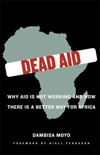
I wanted to share a recent conversation I had with a friend who read a post I wrote about Dambisa Moyo’s recent lecture at the Cato Institute in Washington and more broadly about her book Dead Aid: Why Aid is Not Working and How There is a Better Way for Africa.
My friend took issue with the semantics of the parting words in my post:
…I think Moyo is right in demanding that when any international actor—from celebrities and aid organizations to governments and advocacy groups—chooses to call attention to an issue on the African continent, they do so by soliciting advice and input from the people of this continent.
She said that the phrase “soliciting advice and input” seems inadequate when calling attention to mass atrocities because it makes it sound like as if I’m referring to a bank merger instead of the pressing concerns of real people. She also said that she views both the growing anti-genocide constituency here in the U.S. and the Responsibility to Protect doctrine as founded on the idea that activists don’t need anyone’s permission to take a stand about atrocities occurring around the world, because they violate some universal instinct of our humanity. Michelle at Change.org’s Stop Genocide blog recently voiced a similar sentiment, saying that "imperative to seek an end to…suffering is, in fact, unequivocal."
These ideas are in the spirit of the notion that “injustice anywhere threatens justice everywhere,” and that the suffering of other humans anywhere must be a fundamental concern for us all.
In my opinion, that is what the Enough Project is about. It doesn’t matter whether you are a school teacher, policy wonk, or high school activist; you should feel empowered to stand up and say Enough is Enough, that no population should be subjected to crimes against humanity.
But it is the duty of every activist to make sure that our voices are amplifying the voices of the victims of crimes against humanity in a way that remains true to their experiences. And it is a priority of people who work here at Enough and at other advocacy organizations to work hard to give audience to the voices of local people in eastern Congo, in Darfur, in refugee camps in eastern Chad, and so on—so that they have the chance that activists here in the U.S. have to raise their voices and exercise agency to advocate for change.
A big thanks is due to my friend for engaging in this discussion with me; she said that her comments were “just an intellectual exercise with semantics,” but that she thinks it’s fair to be picky when we are articulating such important and sensitive issues. I agree.

